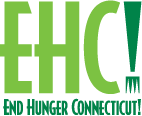SHARE >
Information and resources to help you become an ally this Hunger Action Month and National Suicide Prevention Week, September 2023
Our minds and stomachs are deeply connected. More specifically, the gut-brain connection sends signals back and forth to each other constantly: an intestine in trouble sends a message to the brain and vice versa. If you are feeling stress, anxiety and/or depression, that could be a warning sign that something is wrong in the stomach, like hunger, according to Harvard Health Publishing.
As humans, we are faced with many challenges, uncertainties and decisions every day. For over 490,000 Connecticut citizens – 1 in 8 being children – one of those challenges is a stressful one: finding a way to put enough food on the table every day to properly feed themselves and/or their families.
Hunger is a traumatic experience. Studies show food insecurity can cause chronic stress, behavioral issues, depression and increased risk of drug misuse and poor health outcomes. When children and adults face challenging and traumatic experiences, both their mental and physical health suffers. All of these experiences can lead to the lack of one basic need – food security.
Children are more likely to struggle with hunger and food insecurity than adults and tend to rely on programs like school meals for their only consistent nutrition, according to Feeding America. But once children age out of those lifeline programs, continued lack of access to food and other basic needs can sometimes follow them into adulthood.
“As a pediatrician, every day I see how important it is for children to have access to healthy, nutritious food. Children who experience food insecurity, defined as a lack of access to consistent food or nutritious food are at increased risk of multiple negative health outcomes.”
Dr. Molly Markowitz, Advocacy Committee Chair for the CT Chapter of the American Academy of Pediatrics
Children who age out of the school system and no longer have access to secure meals end up as adults who struggle with mental health and food insecurity without access to behavioral health treatment or proper nutrition. In 2021, people ages 18 to 20 made up just four percent of clients served in community mental health programs in Connecticut. This means that most of these young adults were left to address mental health and hunger alone.
Community Mental Health Affiliates (CMHA), an organization offering extensive behavioral health and substance use services throughout Connecticut, sees the effects of hunger and mental health daily in their clients. CMHA clients often come to session hungry, irritable, or unable to concentrate because there is no food at home or because their younger siblings needed to eat instead.
End Hunger Connecticut! (EHC!);s SNAP Call Center, a resource to assist those interested in applying for Supplemental Nutrition Assistance Program (SNAP) benefits, fields hundreds of calls, many individuals anxious or confused about the application process and need to purchase food as soon as they can. The stress of purchasing groceries only increases with rising food costs due to inflation. A tool from Urban Institute shows the SNAP benefit per meal is $2.73 while the average meal cost is $3.33 for Hartford County. Despite the assistance this national program provides, families are still facing food insecurity.
CMHA and EHC! are both resources designed to support and alleviate the stress of Connecticut residents. CMHA has two community programs that help close the gap for young adults who need mental health services, the Young Adult Assertive Community Treatment Team and CT Stay Strong. In each program, Clinicians, Recovery Specialists and Peer Supports help clients address their mental health symptoms and basic needs, including food. For example, CMHA staff have helped many of the program’s young adults obtain SNAP benefits. CMHA staff also regularly assist clients in accessing local food pantries, including the pantry at CMHA’s Team Time Social Club to help minimize the stress, anxiety, and depression that food insecurity can cause. Between July 2019 and March 2020, CMHA’s Team Time Social Club served 265 unique clients – which means that 265 clients 18+ had access to nourishing meals and a food pantry.
EHC!’s SNAP Call Center fields hundreds of calls per month, completing SNAP screenings, applications, redeterminations and more. Associates are available seven days a week to assist clients in determining if they may be eligible for SNAP benefits. If potentially eligible, EHC! Call Center Associates will process the application right over the phone. Clients can also take comfort in knowing that Call Center Associates are certified in Suicide Prevention through the QPR Institute and are prepared to refer clients in distress to mental health services that can help. To further assist, EHC! runs CT Fresh Match and CT True Match. SNAP users can double their produce and non-produce purchases at participating farmer’s markets (over 30 and counting) across the state. Not only does this allow increased access to fresh, local food, it also supports local growers in our state.
Clients who have access to community resources such as CMHA, EHC! and other statewide and national programs can get the support they need to address food insecurity and mental health needs. Share this to spread the word that help is out there and no one should have to suffer in silence. If you or someone you know is in crisis, call 988 to reach the Suicide and Crisis Lifeline.
Feature Image by Siegfried Poepperl on Unsplash
About us: End Hunger CT! works statewide to eliminate hunger and promote healthy nutrition through outreach, public education, and advocacy. EHC! offers SNAP assistance, nutrition program promotion, doubles SNAP at farmers’ markets, and more to help CT residents in need. To learn more about our services, click here.
Have any questions? Contact our Communications Coordinator, Kimberly Nguyen, at knguyen@endhungerct.org.



